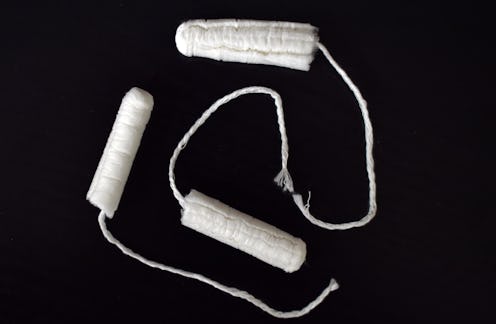News
Women In Prison Won't Have To Beg For Tampons Any More

Amid pressure from lawmakers, the federal Bureau of Prisons announced it is improving access to basic menstrual needs for incarcerated women by ensuring female inmates are given pads and tampons in variety of sizes. While feminine hygiene products can be purchased in prison, former inmates and advocates say they are often of poor quality and limited in quantity — leaving women to beg for them from guards, to spend limited funds on marked-up products for sale in the commissary, or to go without.
According to a BOP memo issued this month, prison wardens will be required to provide women with free tampons and pads in two sizes, as well as panty liners. The announcement was made weeks after a group of Democratic Senators introduced The Dignity for Incarcerated Women Act aimed at increasing quality of life for women behind bars. The Act, introduced in mid-July, would require quality sanitary products to be provided to female inmates at no cost and would ban shackling and solitary confinement for women during labor as well as pregnancy and recovery. It would also require the Bureau of Prisons to take into account the location of children under age 18 when determining a parent's placement in the prison system and would increase opportunities for inmates to communicate with their families and support systems beyond the prison's walls, from telephone calls to videoconferencing, by eliminating charges for those services.
The bill was put forward in mid-July by Sens. Cory Booker of New Jersey, Elizabeth Warren of Massachusetts, Kamala Harris of California and Richard Durbin of Illinois. In August, the Bureau of Prisons — the division of the Department of Justice that handles administration of federal prisons — issued an operational memo laying out the new requirements.
In a roundtable discussion with activists covered exclusively by Bustle, Booker detailed the challenges facing women behind bars:
"Most folks don't understand that so many women are being incarcerated are coming from environments that are not stable, that they are again survivors of violence, they might come in with an addiction... So now you're struggling to recover from an addiction, you're going through withdrawal, you have no resources, you have no support system and you're struggling and all of that, and now you can't even buy soap, toothpaste, sanitary products."
Co-sponsor Harris called the announcement "an imperative step forward" in an Instagram post. In a statement, Booker said he was "encouraged" by the development and committed to ensuring it would be enforced.
Women are the fastest-growing segment of the U.S. prison population with a growth rate eclipsing that of men. While the Dignity Act and Bureau of Prisons memo will only affect the fraction of women serving sentences in federal prison and not those incarcerated in state or local facilities, lawmakers say they hope federal guidelines can serve as a model for the wider criminal justice system.